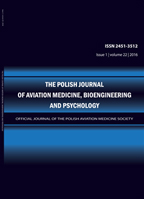2022, Volume 28, Issue 2
FLIGHT PERFORMANCE FOLLOWING ADMINISTRATION OF AN ANTI-FATIGUE STIMULANT DURING 27 HOURS OF CONTINUOUS WAKEFULNESS
RAFAŁ LEWKOWICZ1, ANNA PRZEWODZKA1, JOANNA ŁASZCZYŃSKA1
-------------------------------------------------------------------------------------------------
1Military Institute of Aviation Medicine
Autor korenspondencyjny: RAFAŁ LEWKOWICZ; Military Institute of Aviation Medicine; email: rlewkowicz@wiml.waw.pl
Full text
Streszczenie
Introduction: In the context of military aviation, aircrew members are required to perform a range of complex and cognitively demanding tasks under a variety of conditions, including irregular work schedules, insufficient rest periods, and disrupted circadian rhythms. This study investigates the impact of sleep deprivation on flight performance in a controlled simulator environment and examines whether the pharmacological agents modafinil and galantamine can restore flight performance to baseline levels following 27 hours of wakefulness.
Methods: A group of 12 male volunteers, with a mean age of 24 ± 2.5 years, was tested in three separate sessions during which the participants were randomly assigned to receive either 100 mg of modafinil, 10 mg of galantamine, or a placebo. During the continuous wakefulness period, the participants completed three tests in a flight simulator involving a simple flight control task performed under varied conditions (flight over land and sea).
Results: Galantamine showed significant differences across flight conditions, with improved performance in maintaining altitude under the land and sea conditions (p<0.001). Under the same flight conditions, galantamine had a significant effect on speed, resulting in slower speeds compared to placebo. Additionally, it demonstrated a significant improvement in maintaining a stable heading under sea conditions. Across all parameters, the stimulants did not restore flight accuracy to baseline levels under control conditions.
Conclusions: The effects of both modafinil and galantamine on sleep deprivation-induced fatigue and flight performance were minimal, with results comparable to those of the placebo in most scenarios. Neither agent was able to restore baseline performance after a single dose administered following 27 hours of wakefulness. However, due to several limitations of the study, further research is warranted, with a focus on physiological assessments to strengthen the evidence base for anti-fatigue guidelines.
Słowa kluczowe
flight performance, stimulant, sleep deprivation, fatigue, military aviation
